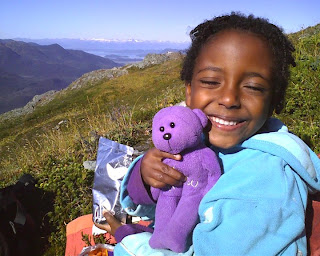 It's Christmas time, and 3.5-year-old TK -- the daughter of a lapsed-Lutheran, questioning-Unitarian mother; the granddaughter of two Lutheran ministers; the child, by birth, of a country that has embraced Christianity and Islam and animism in neighboring regions -- is trying to understand Jesus.
It's Christmas time, and 3.5-year-old TK -- the daughter of a lapsed-Lutheran, questioning-Unitarian mother; the granddaughter of two Lutheran ministers; the child, by birth, of a country that has embraced Christianity and Islam and animism in neighboring regions -- is trying to understand Jesus.Jesus. That little baby born in oh little town of Bethlehem, away in the manger, no crib for a bed. Angels-we-have-heard-on-high sang to him, and we-three-kings brought him gold and oil. The cattle were lowing, and Rudolph won't you guide my sleight tonight? Where's Santa?
Jesus. TK scrunches up her face and studies the nativity scene at her nana's house: the tall slender figures carved out of a dark wood; they look African. She's heard the story; her mama's told her many times, from many different angles. But the shepherd with the long staff bothers her. "He's trying to poke the baby Jesus' eye!" she cries, and moves him to the far end of the table. She gathers the others close around Jesus in the manger. They seem to huddle there, as if guarding each other from the cold of the world outside their circle.
Jesus. In a small Lutheran church in a small Iowan town, TK studies a stained-glass window over her aunt's shoulder, and wants to know if that long-haired person in the white robe is Jesus' mommy. Her mama explains that no, it's Jesus; some people think he had long hair. TK whispers back, "That can't be Jesus. He had brown skin. Like ME." She scans the congregation -- all descended from Scandinavia and Germany.
Jesus. TK leaves a plate of lasagna out for Santa Claus on Christmas Eve, a mug of orange juice, a plate of cookies, and a drawing. "Do we leave something for Jesus, too?" She's not trying to cover her bases, to make sure she gets enough presents. She wants to take care of everyone, always. The lasagna is because she worried that Santa might eat too much unhealthy food in his travels across the world.
Jesus. Her mommy doesn't know, really. He might have just been a man, TK. What does "Immanuel" mean? "God is with us." Singing, "Christ the king was born today," she asks, "He was a king?" But her mommy isn't sure.
In the glowing light of the church on Christmas Eve, Grandpa Gerry, who is also Pastor Gerry, reads from John 1:5, "a light shines in the darkness, and the darkness does not overcome it." TK's eyes sparkle in the flickering candlelight. She has thrown herself into snow angels, she has wrapped her arms around family members, she has jumped and danced and leaped and skipped. She is a light in a too-dark world.
Her mommy tries to be, too.
Jesus. TK wants a story as she falls asleep on Christmas Eve, tired, finally, after listening for reindeer hooves on the roof. "Once, the world was dark. But then a baby was born. . ." The ancient Greeks told the story of Pandora and her box -- and of what remained after sickness and sorrow had screamed into the human world. "Hope -- the thing with feathers, that perches in the soul, and sings the tune without the words and never stops -- at all." Light.
Hope.














